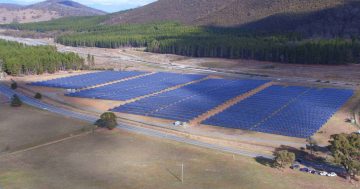
The impacts of climate change are now being factored into all Federal Government policy through a new APS program. Photo: ACT ESA.
The Federal Government’s new Climate Risk and Opportunity Management Program has been established to ensure the Australian Public Service leads by example in the nation’s push towards a decarbonised future.
With the amusing acronym of CROMP, the program will support bosses and staff across all APS agencies and departments to seize the opportunities in the transition to net zero.
CROMP aims to help the APS be more aware of lowering emissions and how to navigate a changing climate.
The program will offer specialist climate risk training, a management guide and support services.
It will upskill the APS to identify and manage the impacts of climate change on government policies, programs, assets and services.
CROMP will also help ensure Commonwealth funding goes into projects that are resilient to a changing climate and offer value for money by taking advantage of energy efficiency and affordable renewable energy.
In launching the program, Assistant Minister for Climate Change and Energy Jenny McAllister said CROMP would future proof outcomes while also maximising value for money.
“A better-prepared public service will mean better results for communities, whether that be the uptake of affordable renewable energy in public buildings or supporting farmers to respond to droughts,” she said.
“When climate risk management is embedded in decision-making, you get better outcomes.
“It can ensure roads, homes and infrastructure are built to withstand more frequent heatwaves, increased rainfall or flooding and help departments and agencies identify opportunities to generate growth in new markets and trade sectors such as hydrogen and critical minerals.
“The government is building up the capacity of our institutions and positioning Australia to become a global leader in public sector climate risk and management.”
A recommendation from the Climate Change Authority 2023 Annual Progress Report is to: “Secure agreement with all levels of government on a framework to ensure that climate change risk and adaptation are factored into all policies and programs and their implementation, including but not limited to critical infrastructure, building codes, health, social services policies (such as those on public housing), transport, environmental protection, national security, and sectoral decarbonisation plans.”
Flagging the development of CROMP, the report said the program aims to develop the capabilities and systems needed for the APS to identify, manage and disclose climate risks.
“The need to integrate climate risk considerations across all policy areas was emphasised by multiple stakeholders during consultation, particularly regarding the National Construction Code and building standards,” the report states.
“However, the level of influence that the CROMP will have across policy areas and different levels of government is unclear.
“This is important to consider as most of the remit for adaptation implementation sits with sub-national governments.”
Public servants can learn about how climate change risks and opportunities can impact their work by visiting the Australian Government’s Approach to Climate Risk and Opportunity Management in the Public Sector 2023-26.
It details how the government will coordinate, report, evaluate and prioritise climate risk management at a whole-of-government level, and it sets out how all Commonwealth agencies will assess and report their climate risks.
The program has downloadable guides that give step-by-step instructions and advice on identifying and managing climate risks and opportunities. There are online learning modules about climate change risks and opportunities and a support service.
Members of the APS can access this material at the APS Academy.
The program supports the Roadmap for Net Zero, the government’s commitment to achieve net zero by 2030 in government operations.
Original Article published by Chris Johnson on Riotact.











